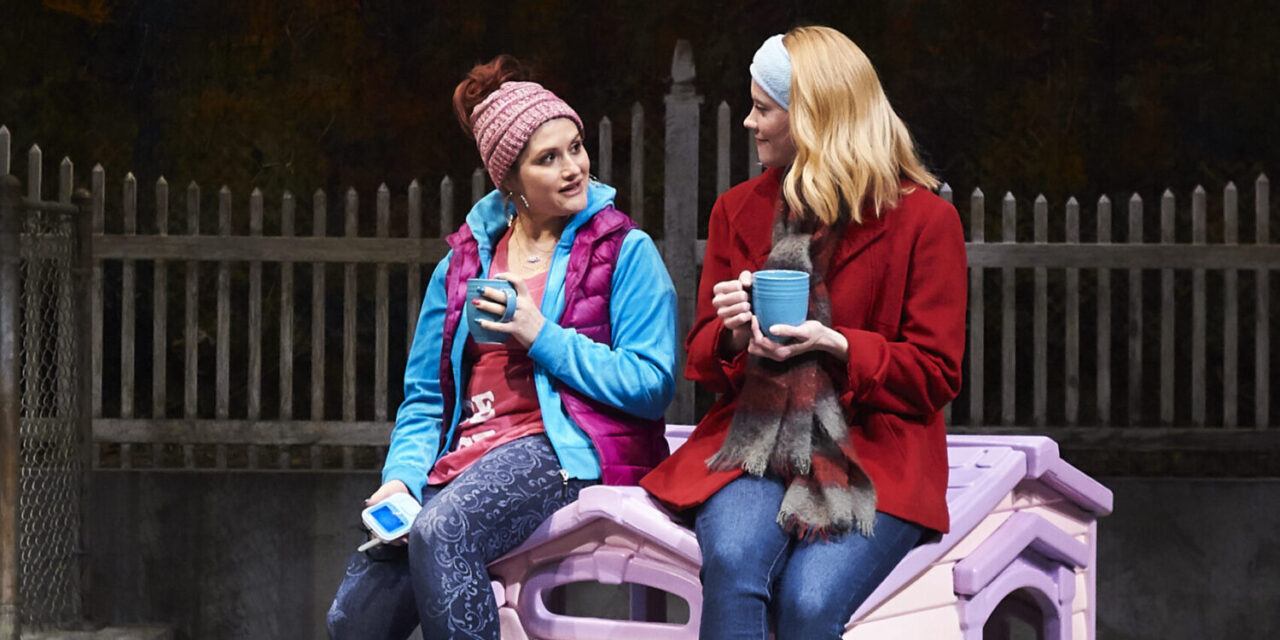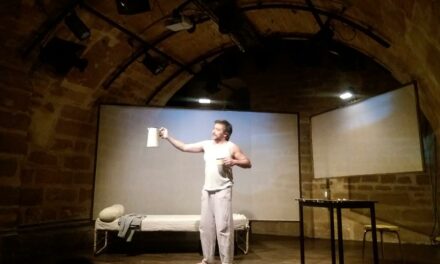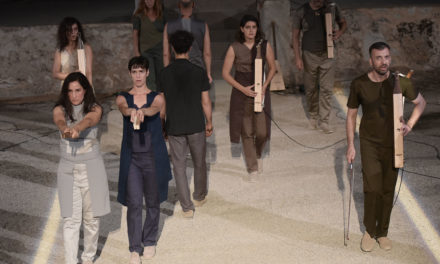There are likely as many ways to relate to Molly Smith Metzler’s play Cry It Out as there are ways to react as a parent – and particularly as a mother – to the birth of one’s first child.
The play revolves around the unlikely friendship that blossoms between Lina (Julianne Avolio) and Jessie (Sarah Goeke), two women who have little in common other than the fence that separates their backyards and the fact that both are pretty much homebound with newborns. Lina works an entry-level job in hospital administration; Jessie is a lawyer on track to become partner at a Manhattan law firm. But although class divides these two women, the stir-crazy isolation of new motherhood pulls them together for coffee and contact. Tethered via video baby monitors to the young tyrants who now dominate their time and attention, Lina and Jessie snatch precious moments of sane conversation in the narrow zone of Jessie’s backyard that remains in signal range of each of their nurseries.
I love this device as a metaphor for the play’s interest in exploring the emotional tug-of-war between the autonomous “pre-baby” self and the on-demand “post-baby” one that early motherhood pitches many women into: hungry as they are for adult conversation, and exhausted and irritated as they are by the nonstop demands of infant care, neither of the women can, nor wishes to, resist the pull of her baby’s need for her. Thus the women soon find they have another thing in common: both are reluctant to return to work and leave baby in the care of others when their maternity leave is over (although here, importantly, class and privilege overdetermine both the choice of whether to go back to work and the practical ramifications of finding suitable child care arrangements).
The intrusion into this cozy friendship comes in the form of Mitchell (Tim McGeever), a neighbor from the wealthy enclave sited on the hill above who thinks there is something deeply wrong with his own wife, Adrienne (Rebecca Hirota), who has also recently had a baby and is withdrawn and isolated. It turns out, however, that she is not suffering from anything but frustration and anger: unlike Jessie and Lina, Adrienne wants nothing more than to get back to her career and her creative life after having a baby, and she is chafing under social expectations that she sacrifice her time and energy wholly to motherhood.
Metzler is exploring uncharted dramatic territory here: I cannot think of another play that trains a keen and sympathetic eye on the nether zone of identity shift that new parenthood represents. She seems particularly attuned to the way becoming a parent can shift one’s expectations and reorient priorities, bringing a character like Jessie, for example, to the realization that she’d rather stay at home with her child than return to her career. Such unexpected transformations are the stuff of poignant drama, and Goeke makes palpable her character’s dawning recognition of her changed desires and needs. Metzler is particularly good on the details of the mother/baby bond: at one point Jessie describes her baby taking a pause from nursing “just to flirt, really,” a line that struck such a chord of recognition that I swear I started to feel the tingly sensation of a milk letdown, even though it’s been over sixteen years since I last nursed a baby. Yet I could have wished that the play did not stack the deck quite so much against Adrienne’s reaction to becoming a mother: I suspect I am not the only audience member who can relate most to her attitude (I, too, was quite ready to get back to work that I loved after too many months cooped up with a baby!), and I found it off-putting that she comes off as so cold, strident, self-involved, overly privileged, and a bit off her rocker.
Nevertheless, Metzler’s writing is both funny and touching, and the City Theatre production, under Kim Weild’s unfussy direction, captures the wide and sometimes unexpected range of emotions that flare up as the characters navigate their own personal journeys into that new identity of parenthood, journeys that are directly or indirectly shaped by class, family dynamics, and social pressures (the latter three represented visually in Anne Mundell’s striking scenic design by the row of lit houses looking down on the action from above). In particular, Julianne Avolio gives a brilliant performance as Lina: by turns tough, acerbic, generous, and vulnerable, she traverses an emotional arc that is in the end both brave and quite moving. While all of the characters in the play are torn between a life of work outside the home and the need to care for a child within, for Lina – the character with the least privilege and the least choice – that conflict is particularly acute. In limning both the differences and similarities between Lina and the other three characters, Metzler shows herself once again to be an astute observer of class divisions and reminds us how utterly imbricated the personal is with the political.
This article was originally posted in The Pittsburgh Tatler on 9 March 2020, and has been reposted with permission. To read the original article, click here.
This post was written by the author in their personal capacity.The opinions expressed in this article are the author’s own and do not reflect the view of The Theatre Times, their staff or collaborators.
This post was written by Wendy Arons.
The views expressed here belong to the author and do not necessarily reflect our views and opinions.


















